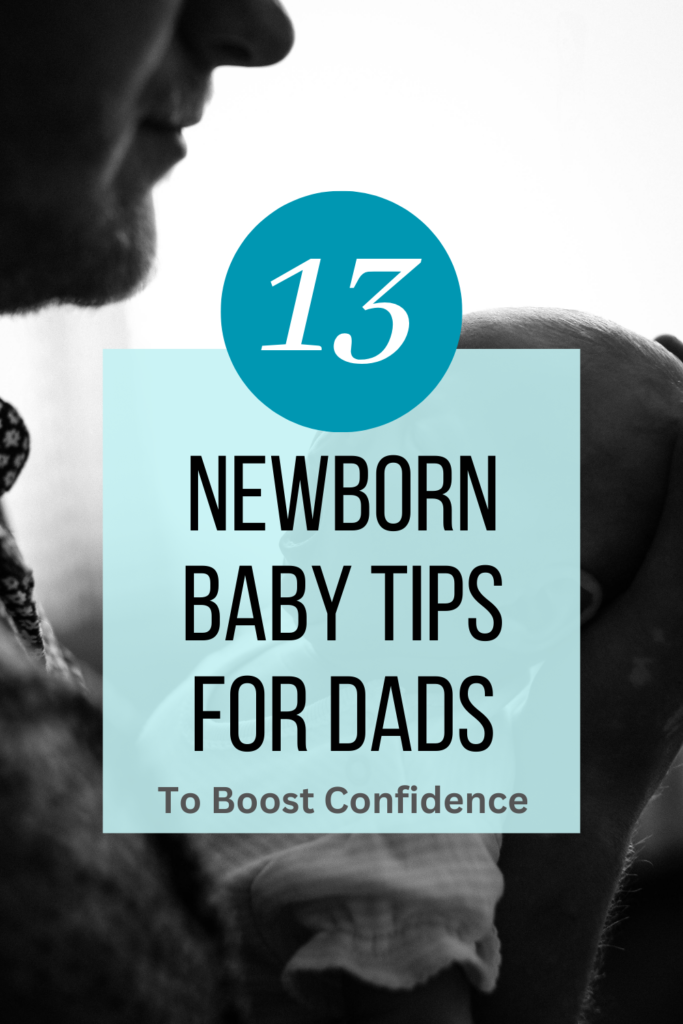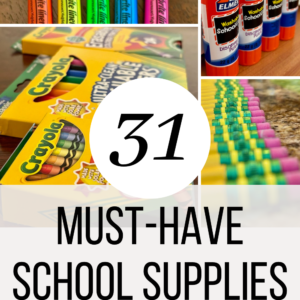Are you wondering how to prepare for being a dad? This blog provides newborn baby tips for dads to empower you and boost your confidence.

Hey there, fellow dad! Congrats on the new addition to your family. As a dad of two little ones, I know how overwhelming those first few weeks can be. The new dad responsibilities come at you in an instant! But don’t worry—I’ve got your back. Here are my top 13 newborn baby tips for dads to boost your confidence and help you navigate this incredible journey.
Here are my top 13 newborn baby tips for dads to help you navigate this incredible journey with ease and confidence.
Tip 1: Educate Yourself About Newborn Care
Before the baby arrives, it’s crucial to immerse yourself in all things baby-related. Read parenting books and articles, and watch informative videos. Consider attending prenatal classes to get hands-on experience and ask questions. Knowing what to expect can significantly reduce anxiety and make you feel more prepared. This proactive approach is a key part of learning how to prepare for being a dad, as it helps you understand the basics of newborn care and what your new role will entail. Here’s a great book that helped my wife and I a lot.
Tip 2: Prepare the Nursery
Setting up the nursery is an exciting milestone. Choose a safe crib, a comfortable changing table, and other essentials. Anchor furniture and keep small objects out of reach to ensure a safe environment. Opt for items that grow with your baby, like a crib that converts into a toddler bed. It’s also a good idea to keep a well-stocked diaper changing station nearby. This not only saves time but also makes diaper duty more efficient. Check out our blog, 4 Must-Know Tips When Preparing a Nursery for a Newborn, for some helpful tips.
Also, if you haven’t completed the nursery yet, check out 13 Must-Have Nursery Essentials Needed for Baby’s First Room to see if you’ve got all of the main nursery essentials.
Tip 3: Share Responsibilities with Your Partner
Sharing the load with your partner is crucial. In most cases, your partner just carried your baby for nine months and is already tired. Regardless, if you’re a new parent, this is a culture shock for both of you. However, even if this isn’t your first child, adding another newborn while caring for the other children is tough.
Open Communication
Start by having open discussions with your partner about each other’s expectations and preferences. This helps you understand each other’s strengths, weaknesses, and comfort zones. Also, ask at the end of the day what went well and what didn’t—and how it could improve. This continuous feedback loop ensures that both of you are on the same page and can make necessary adjustments.
Divide Tasks Fairly
Dividing tasks in a way that feels fair and balanced is essential. Discuss and agree on who will handle nighttime feedings, diaper changes, soothing the baby back to sleep, and other daily duties. Try your best to be a rockstar dad by taking turns with everything. This approach allows both parents to rest and recharge, preventing burnout and ensuring that both of you are involved in your baby’s care.
Be an Active Participant
Remember, being an active dad isn’t just about helping out; it’s about being present and involved in your child’s upbringing. Engage in activities like feeding, bathing, and playing with your baby. Your active participation not only strengthens your bond with your child but also lightens the load for your partner.
Strengthen Your Partnership
This collaborative approach not only strengthens your partnership but also helps you both feel more connected to your baby’s daily life. Sharing responsibilities helps in managing the common stressors that come with parenting, making the journey more enjoyable for both of you. By working together, you can create a supportive and loving environment for your growing family.
Tip 4: Build a Support System
As a new dad, you’re immersed in a ton of responsibility. Obviously, you have your partner to lean on and share responsibilities, but no couple should go through this journey alone. There will be times when you both just need a break. Don’t hesitate to reach out and involve family and friends and lean on them for support. Having a support system is crucial for your well-being and helps you navigate new dad responsibilities more effectively.
I didn’t use it myself, but if you don’t have anyone to lean on, some communities offer new dad support groups where you can share experiences and get advice. There are also online forums that can be great resources for connecting with other dads. It’s amazing how much support is out there when you ask for it.
Tip 5: Spend Quality Bonding Time
Bonding with your baby is one of the most rewarding aspects of parenthood. As mentioned in Essential Parenting Advice for Dads: 25 Tips You Need to Know, engaging in skin-to-skin contact, especially in the early days, helps regulate the baby’s temperature, reduces the stress of the baby, and strengthens your bond. Talk, sing, and read to your baby; your voice is soothing to them and helps in their cognitive development. Babywearing is another fantastic way to bond while keeping your hands free for other tasks. It also provides comfort to your baby, who enjoys being close to you. Regularly spending quality time with your baby fosters a deep connection and boosts your confidence as a parent. Here’s a top-rated baby carrier that I loved using.
Tip 6: Master How to Change a Diaper
Diaper duty is an essential part of parenting, and mastering it can make your life much easier. Start by choosing the right diapers that fit well and prevent leaks. Have all your supplies, like wipes and creams, within arm’s reach to make the process smooth and efficient. Diaper changes are also a great opportunity to check for any signs of diaper rash or irritation and to bond with your baby. Keep your changing area organized and restock supplies regularly to avoid last-minute scrambles. Over time, you’ll find your rhythm, and what once felt like a daunting task will become second nature.
Tip 7: Learn How to Swaddle
Swaddling is an age-old technique that can help soothe and calm your baby, making it easier for them to sleep. Practice makes perfect, so don’t be discouraged if it takes a few tries to get it right. Use a lightweight, breathable blanket and wrap your baby snugly but not too tightly, ensuring their hips can move freely. Here was our favorite swaddle blanket. Swaddling helps prevent the startle reflex, which can wake your baby from sleep. It’s also a comforting and familiar feeling for them, reminiscent of being snug in the womb. Our oldest son loved the Miracle Blanket Swaddle Wrap. I thought this was easier to maneuver, and it kept me secure for longer than a swaddle blanket. As your baby grows, transition them out of the swaddle to ensure safety.
Tip 8: How to Calm a Crying Baby
Understanding and calming a crying baby is one of the most challenging aspects of early parenthood. However, with a few strategies and an understanding of the reasons behind the crying, you can soothe your baby effectively. Here’s a deeper dive into calming techniques:
Understanding the Reasons for Crying
Babies cry to communicate their needs, and understanding these can help you respond more effectively. Common reasons include hunger, tiredness, discomfort, or the need for a diaper change. Sometimes, they might just want to be held. Learning to distinguish between different types of cries can be incredibly helpful.
Babies cry to communicate their needs, and as a new dad, it’s important to understand the most common reasons behind those cries. Here are the top five reasons babies cry and how to address each one:
Top Five Reasons for Baby Crying
1. Hunger
One of the most common reasons babies cry is because they are hungry.
- Signs: Rooting (turning their head towards your hand when you stroke their cheek), sucking on their fists, and lip-smacking are cues that your baby might be hungry.
- Solution: Newborns typically need to eat every 2-3 hours or whatever schedule is agreed upon with your pediatrician. If you’re within or over this feeding window, try feeding your baby.
2. Tiredness
Babies can become overtired and have trouble falling asleep.
- Signs: Yawning, rubbing their eyes, and fussiness are common indicators.
- Solution: Create a calming bedtime routine. Swaddling, rocking, or using white noise can help soothe them to sleep.
3. Dirty Diaper
- : A wet or soiled diaper can make a baby uncomfortable and fussy.
- Signs: Checking the diaper regularly can help you catch this early. Just feeling the diaper or taking a quick peek can sometimes be a quick indicator. If it’s wet, it can sometimes feel full. From our experience, we recommend Pampers Swaddlers. They have a yellow line when they’re dry, and it turns blue when they’re wet.
- Solution: Change the diaper promptly. Keeping your baby clean and dry helps prevent diaper rash and discomfort.
4. Need for Comfort
Sometimes, babies cry because they need to feel secure and comforted.
- Signs: If your baby stops crying when held or swaddled, they might be seeking comfort.
- Solution: Try holding your baby; skin-to-skin contact or using a baby carrier can provide the comfort they need.
5. Gass or Colic
Babies can experience discomfort from gas or colic, which causes intense, prolonged crying.
- Signs: Pulling their legs up to their stomach, clenching their fists, and having a hard, bloated belly are common signs.
- Solution: Burping your baby after feedings, using anti-gas drops, or trying bicycle leg movements can help relieve gas. If colic is suspected, consult with your pediatrician for further advice.
Top Baby Crying Soothing Techniques
1. Swaddling
As mentioned above, swaddling involves wrapping your baby snugly in a blanket. This can recreate the feeling of being in the womb and help soothe them. Be sure to leave enough room for their hips and legs to move. Swaddling can help calm babies and make them feel secure.
2. White Noise
White noise can mimic the sounds of the womb and help soothe a crying baby. You can use a white noise machine or a simple fan, and apps are also available for this purpose. We now use the Hatch Rest+ Baby, as it’ll grow with your little one and help through elementary school and beyond. It allows you to set colors for sleep time and a different color for wake time, given that young kids don’t know how to tell time. My favorite feature is its battery backup. If the power goes out, it continues to work.
3. Rocking and Movement:
Gently rocking your baby in your arms, in a rocking chair, or using a baby swing can be calming. The rhythmic movement can be very soothing for babies.
4. Pacifiers
Some babies have a strong sucking reflex and find comfort in sucking. Offering a pacifier can help calm them. However, make sure to choose a pacifier that is appropriate for your baby’s age and size. Our son loved the Philips Avent Soothie pacifier. He loved it so much that it was hard to break later. However, our daughter never really liked pacifiers.
5. Skin-to-Skin Contact
Holding your baby close, skin-to-skin can be incredibly soothing. It provides warmth and comfort and can help regulate their heartbeat and breathing.
When to Seek Medical Advice
While crying is normal, there are times when it may indicate something more serious. If your baby cries excessively, seems inconsolable, or shows signs of illness (like fever, vomiting, or difficulty breathing), it’s important to seek medical advice. Trust your instincts and consult your pediatrician if you’re concerned.
As a new dad, all of this will be new to you at first. However, being aware of each of the top reasons and attempting these solutions / soothing techniques will help you understand and respond to your baby’s cries. It can be challenging, but with patience and practice, you’ll become more attuned to their needs and preferences. In the beginning, this is a trial and error process; you just have to start and find what works best for your little one. Between our two kids, my son liked certain things that were different than my daughter. Just do your best and keep your calm – I used just to sing in my head Trace Atkins’s “You’re Going to Miss This” song in my head, knowing that this phase is just a season and will pass. Remember, it’s okay to ask for help and seek guidance if you’re feeling overwhelmed.
Tip 9: Be Hands-On With Bath Time
If you haven’t already, please know that babies can’t just use a regular bathtub yet – they still require a small bath to hold and support them because they aren’t able to hold themselves up yet. We started out using the Frida Baby 4-in-1 Grow with Me Bathtub. Start by being proactive and having all necessary items within reach so that you never leave your baby unattended during bath time. Use safe and comfortable bathing techniques, ensuring the water temperature is just right—warm but not hot or cold. Choose gentle, baby-specific bath products that are easy on sensitive skin.
Bath time is more than just a cleanliness routine; it’s a great bonding opportunity. Make bath time enjoyable by singing or playing with your baby, which helps them associate water with fun. This is also an excellent time to check your baby’s skin for any unusual marks or rashes.
Tip 10: Embrace Your New Role
Being a new dad is an exciting and sometimes overwhelming experience. Accept that you won’t get everything right the first time, and that’s perfectly okay. Embrace the learning curve and celebrate small victories, whether it’s successfully calming your baby or mastering a new skill like swaddling. Patience is key; both you and your baby are learning and adapting to this new life. Remember that it’s normal to feel unsure or overwhelmed at times. The important thing is to be present, involved, and loving. Like everything else in life, you have to practice to get good at it. The good news is that babies, like us, are creatures of habit – they’ll do the same things over and over and have preferences. Your confidence will grow as you gain more experience.
Tip 11: Seek Help When Needed
Your mental health is just as important as your baby’s well-being. If you’re feeling overwhelmed, stressed, or anxious, don’t hesitate to seek help. Talk to your spouse, friends, and family, and if it gets too bad, a healthcare professional. Connecting with others to talk through these scenarios helps. There are numerous resources available that can offer guidance and support. Remember, seeking help is a sign of strength, not weakness. It’s important to take care of yourself so that you can be the best parent possible. However, this could be as simple as inviting someone you trust over to watch the baby for an hour or two so that you and your partner can take a nap, catch up on your to-do list, or take a quick lunch date for a mental break.
From my experience, a lot is determined by how you’re framing things. For example, when you’re tired from the lack of sleep, it can make you irritable. Being irritable makes any small problem seem really big – creating this vicious cycle. However, shift your focus from being tired to being thankful and having gratitude about this moment and knowing this is just a phase that will one day pass. Therefore, you need to enjoy all of these small moments because they really do fly by. Before you know it, you’ll snap your fingers, and your newborn is 4+ years old.
Tip 12: Stay Involved and Informed
Staying involved in your baby’s life means being proactive about their health and development. Attend pediatric appointments, ask questions, and learn about each developmental milestone by reading to be proactive. Keep track of any concerns or observations, as this can be helpful when you speak with your healthcare providers. Staying informed also means continuing to educate yourself about parenting techniques, baby health, and safety practices. This ongoing learning process helps you feel more confident and equipped to handle new challenges as they arise. It’s also a great way to bond with your baby and celebrate their growth and achievements.
Tip 13: Make Time for Yourself and Your Partner
I saved the best for last – however, it’s also the hardest to incorporate. Balancing baby care with personal time is essential for maintaining your well-being and your relationship. Make a conscious effort to plan date nights or couple activities to reconnect with your partner. Once kids come along, priorities for both parents typically shift into survival mode – which primarily involves doing the essential household chores, doing everything to raise the kids, and ensuring they’re happy, which only leaves a tiny bit of self-care. The time to focus on your relationship gets deprioritized unless you’re intentional by scheduling and making this time a priority from the beginning. Remember, nurturing your relationship is also an important aspect of being a good parent.
Additionally, find moments for self-care, whether it’s a hobby, exercise, or simply relaxing. Taking care of yourself allows you to recharge and be more present and attentive with your family. Maintaining a healthy balance helps ensure that you’re not only a happy dad but also a supportive partner. Again, this can be tough. I’m not saying you need or should go play a 3-4 hour round of golf, but even slipping away for 5, 10, or 20 minutes to do something for you can go a long way. Just again, focus on unwinding and being grateful for whatever time you have. Then, encourage your spouse to do the same.
Conclusion
There you have it—my top 13 newborn baby tips for dads. Applying these tips will boost your confidence and make your journey as a new dad a bit smoother. Remember, you’re not alone in this journey. We’re all in this together. You got this!
This post was all about newborn baby tips for dads.
Related Posts to check out if you haven’t already…
- Essential Parenting Advice for Dads: 25 Tips You Need to Know
- Fathers Role During Pregnancy: Practical Guide for Expectant Fathers
- Role of a Father in the Bible: Practical Advice for Everyday Life
This site contains affiliate links; view the disclaimer page for more information. As an Amazon Affiliate Associate, I earn from qualifying purchases.




Leave a Reply